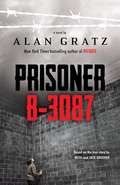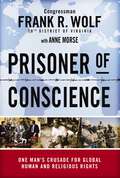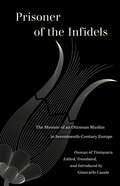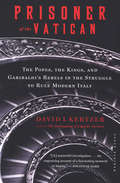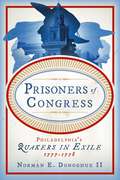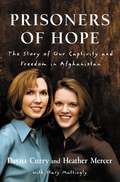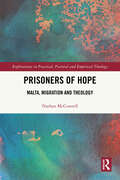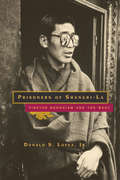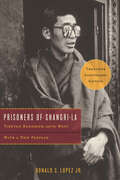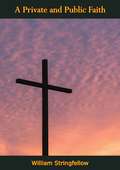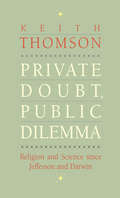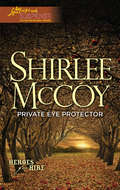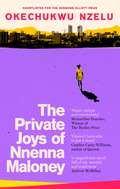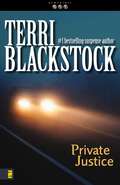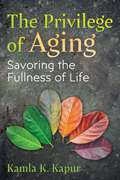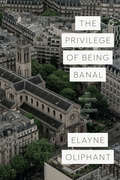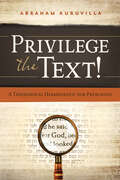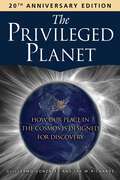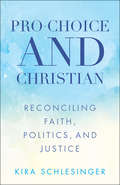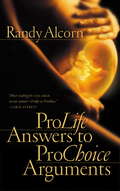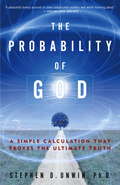- Table View
- List View
Prisoner B-3087
by Alan Gratz<p>Survive. At any cost. 10 concentration camps. 10 different places where you are starved, tortured, and worked mercilessly. It's something no one could imagine surviving. But it is what Yanek Gruener has to face. <p>As a Jewish boy in 1930s Poland, Yanek is at the mercy of the Nazis who have taken over. Everything he has, and everyone he loves, have been snatched brutally from him. And then Yanek himself is taken prisoner -- his arm tattooed with the words PRISONER B-3087. <p>He is forced from one nightmarish concentration camp to another, as World War II rages all around him. He encounters evil he could have never imagined, but also sees surprising glimpses of hope amid the horror. He just barely escapes death, only to confront it again seconds later. <p>Can Yanek make it through the terror without losing his hope, his will -- and, most of all, his sense of who he really is inside? Based on an astonishing true story.</p>
Prisoner of Conscience: One Man's Crusade for Global Human and Religious Rights
by Anne Morse Frank WolfWhat’s a congressman from Virginia doing in places where bullets fly and babies starve? Thirty years ago, Frank Wolf was elected to the U.S. Congress to address local transportation issues. Fueled by a faith that made him believe he could do something about it, the congressman grew to champion human and religious rights around the world—from cracking down on gang-related crimes in the U.S. to relieving suffering from war, AIDS, and famine in places like Darfur, China, and Bosnia. Eventually, he became a key proponent of opposing radical Jihadists and creating a National Committee on Terrorism. As Wolf visited some of the most dangerous places in the world, he saw firsthand the need for members of Congress to speak out for persecuted people around the globe. In Prisoner of Conscience, he shares intimate stories of his adventures from the halls of political power to other dangerous places around the world, what he has learned along the way, and what you can do about it now.
Prisoner of the Infidels: The Memoir of an Ottoman Muslim in Seventeenth-Century Europe
by Osman of TimisoaraVictor Hugo meets Papillon in this effervescent memoir of war, slavery, and self-discovery, told with aplomb and humor in its first English translation. A pioneering work of Ottoman Turkish literature, Prisoner of the Infidels brings the seventeenth-century memoir of Osman Agha of Timişoara—slave, adventurer, and diplomat—into English for the first time. The sweeping story of Osman’s life begins upon his capture and subsequent enslavement during the Ottoman–Habsburg Wars. Adrift in a landscape far from his home and traded from one master to another, Osman tells a tale of indignation and betrayal but also of wonder and resilience, punctuated with queer trysts, back-alley knife fights, and elaborate ruses to regain his freedom. Throughout his adventures, Osman is forced to come to terms with his personhood and sense of belonging: What does it mean to be alone in a foreign realm and treated as subhuman chattel, yet surrounded by those who see him as an object of exotic desire or even genuine affection? Through his eyes, we are treated to an intimate view of seventeenth-century Europe from the singular perspective of an insider/outsider, who by the end his account can no longer reckon the boundary between Islam and Christendom, between the land of his capture and the land of his birth, or even between slavery and redemption.
Prisoner of the Vatican: The Popes, the Kings, and Garibaldi's Rebels in the Struggle to Rule Modern Italy
by David I. KertzerA Pulitzer Prize winner&’s &“fascinating&” account of the political battles that led to the end of the Papal States (Entertainment Weekly). From a National Book Award–nominated author, this absorbing history chronicles the birth of modern Italy and the clandestine politics behind the Vatican&’s last stand in the battle between the church and the newly created Italian state. When Italy&’s armies seized the Holy City and claimed it for the Italian capital, Pope Pius IX, outraged, retreated to the Vatican and declared himself a prisoner, calling on foreign powers to force the Italians out of Rome. The action set in motion decades of political intrigue that hinged on such fascinating characters as Garibaldi, King Viktor Emmanuel, Napoleon III, and Chancellor Bismarck. Drawing on a wealth of secret documents long buried in the Vatican archives, David I. Kertzer reveals a fascinating story of outrageous accusations, mutual denunciations, and secret dealings that will leave readers hard-pressed to ever think of Italy, or the Vatican, in the same way again. &“A rousing tale of clerical skullduggery and topsy-turvy politics, laced with plenty of cross-border intrigue.&” —Kirkus Reviews, starred review
Prisoners of Congress: Philadelphia’s Quakers in Exile, 1777–1778
by Norman E. Donoghue IIIn 1777, Congress labeled Quakers who would not take up arms in support of the War of Independence as “the most Dangerous Enemies America knows” and ordered Pennsylvania and Delaware to apprehend them. In response, Keystone State officials sent twenty men—seventeen of whom were Quakers—into exile, banishing them to Virginia, where they were held for a year.Prisoners of Congress reconstructs this moment in American history through the experiences of four families: the Drinkers, the Fishers, the Pembertons, and the Gilpins. Identifying them as the new nation’s first political prisoners, Norman E. Donoghue II relates how the Quakers, once the preeminent power in Pennsylvania and an integral constituency of the colonies and early republic, came to be reviled by patriots who saw refusal to fight the English as borderline sedition. Surprising, vital, and vividly told, this narrative of political and literal warfare waged by the United States against a pacifist religious group during the Revolutionary War era sheds new light on an essential aspect of American history. It will appeal to anyone interested in learning more about the nation’s founding.
Prisoners of Hope: The Story of Our Captivity and Freedom in Afghanistan
by Stacy Mattingly Dayna Curry Heather MercerThe gripping and inspiring story of two extraordinary women--from their imprisonment by the Taliban to their rescue by U. S. Special Forces. When Dayna Curry and Heather Mercer arrived in Afghanistan, they had come to help bring a better life and a little hope to some of the poorest and most oppressed people in the world. Within a few months, their lives were thrown into chaos as they became pawns in historic international events. They were arrested by the ruling Taliban government for teaching about Christianity to the people with whom they worked. In the middle of their trial, the events of September 11, 2001, led to the international war on terrorism, with the Taliban a primary target. While many feared Curry and Mercer could not survive in the midst of war, Americans nonetheless prayed for their safe return, and in November their prayers were answered. InPrisoners of Hope, Dayna Curry and Heather Mercer tell the story of their work in Afghanistan, their love for the people they served, their arrest, trial, and imprisonment by the Taliban, and their rescue by U. S. Special Forces. The heart of the book will discuss how two middle-class American women decided to leave the comforts of home in exchange for the opportunity to serve the disadvantaged, and how their faith motivated them and sustained them through the events that followed. Their story is a magnificent narrative of ordinary women caught in extraordinary circumstances as a result of their commitment to serve the poorest and most oppressed women and children in the world. This book will be inspiring to those who seek a purpose greater than themselves. From the Hardcover edition.
Prisoners of Hope: Malta, Migration and Theology (Explorations in Practical, Pastoral and Empirical Theology)
by Nathan McConnellPrisoners of Hope focuses on ecclesiological and practical theological responses to migration, asylum-seeking, and refugee integration and assimilation. It considers the relationship between the church and the nation-state relative to political asylum by questioning the various responses of Christians who advocate for refugees and asylum-seekers in their spheres of influence. Prisoners of Hope features how the Church might begin to appraise and address the various socio-political strategies employed by nation-states, which situate migrants in a form of “quasi-political” status as they move from one place to another. It holds key benefits for exploring the philosophical and theological intersections of Dietrich Bonhoeffer, Giorgio Agamben, and Seyla Benhabib and those attempting to ask about treatment of the refugees and asylum-seekers. Prisoners of Hope will be of particular interest to those attempting scholarly research in the areas of theology, religion, and migration studies as it investigates the phenomenological experiences of refugees going “in” and “out” of detention as well as arguments relating to porous borders within sovereign national entities. Initially, the book engages definitions of migration, moving onto concepts of State of Exception and Homo Sacer, and analysing arguments regarding porous borders and cosmopolitanism. Of specific benefit for Christian theology is the second half of the book, which examines the importance of vicarious witnessing, prayer, voicing inclusion, worshipping communities, and the inclusion of the “other.” Overall, Prisoners of Hope is a pertinent addition to those discussing concepts of national sovereignty, migrant assimilation, asylum-seeking, hospitality, and the juxtapositioning of the foreigner within the often, intricate dialogues associated with political entry.
Prisoners of Shangri-La: Tibetan Buddhism and the West
by Donald S. Lopez Jr.Prisoners of Shangri-La is a provocative analysis of the romance of Tibet, a romance that, even as it is invoked by Tibetan lamas living in exile, ultimately imprisons those who seek the goal of Tibetan independence from Chinese occupation. "Lopez lifts the veil on America's romantic vision of Tibet to reveal a country and a spiritual history more complex and less ideal than popular perceptions allow. . . . Lively and engaging, Lopez's book raises important questions about how Eastern religions are often co-opted, assimilated and misunderstood by Western culture."--Publishers Weekly "Proceeding with care and precision, Lopez reveals the extent to which scholars have behaved like intellectual colonialists. . . . Someone had to burst the bubble of pop Tibetology, and few could have done it as resoundingly as Lopez."--Booklist "Fascinating. . . [A] provocative exploration. Lopez conveys the full dizziness of the Western encounter with Tibet and Tibetan Buddhism."--Fred Pheil, Tricycle: The Buddhist Review "A timely and courageous exploration. . . . [Lopez's] book will sharpen the terms of the debate over what the Tibetans and their observers can or should be doing about the place and the idea of Tibet. And that alone is what will give us all back our Shambhala."--Jonathan Spence, Lingua Franca Book Review "Lopez's most important theme is that we should be wary of the idea . . . that Tibet has what the West lacks, that if we were only to look there we would find the answers to our problems. Lopez's book shows that, on the contrary, when the West has looked at Tibet, all that it has seen is a distorted reflection of itself."--Ben Jackson, Times Higher Education Supplement
Prisoners of Shangri-La: Tibetan Buddhism and the West
by Donald S. Lopez Jr.To the Western imagination, Tibet evokes exoticism, mysticism, and wonder: a fabled land removed from the grinding onslaught of modernity, spiritually endowed with all that the West has lost. Originally published in 1998, Prisoners of Shangri-La provided the first cultural history of the strange encounter between Tibetan Buddhism and the West. Donald Lopez reveals here fanciful misconceptions of Tibetan life and religion. He examines, among much else, the politics of the term “Lamaism,” a pejorative synonym for Tibetan Buddhism; the various theosophical, psychedelic, and New Age purposes served by the so-called Tibetan Book of the Dead; and the unexpected history of the most famous of all Tibetan mantras, om mani padme hum. More than pop-culture anomalies, these versions of Tibet are often embedded in scholarly sources, constituting an odd union of the popular and the academic, of fancy and fact. Upon its original publication, Prisoners of Shangri-La sent shockwaves through the field of Tibetan studies—hailed as a timely, provocative, and courageous critique. Twenty years hence, the situation in Tibet has only grown more troubled and complex—with the unrest of 2008, the demolition of the dwellings of thousands of monks and nuns at Larung Gar in 2016, and the scores of self-immolations committed by Tibetans to protest the Dalai Lama’s exile. In his new preface to this anniversary edition, Lopez returns to the metaphors of prison and paradise to illuminate the state of Tibetan Buddhism—both in exile and in Tibet—as monks and nuns still seek to find a way home. Prisoners of Shangri-La remains a timely and vital inquiry into Western fantasies of Tibet.
A Private and Public Faith (The\foundations Quartet: Ser.)
by William StringfellowThe author hits hard at the manipulation of religion for personal, corporate and national self-interests; and sets forth the possibility and content of a relevant and honest witness to Christ in both private and public affairs.“This is a tract. It consists of four essays about the status of religion in contemporary American society and about the condition of the churches of American Protestantism.“As I find it, religion in America is characteristically atheistic or agnostic. Religion has virtually nothing to do with God and has little to do with the practical lives of men in society. Religion seems, mainly, to have to do with religion. The churches—particularly of Protestantism—in the United States are, to a great extent, preoccupied with religion rather than with the Gospel.That, in brief, is the substance of the essays in this tract.”
Private Doubt, Public Dilemma
by Keith Stewart ThomsonEach age has its own crisis--our modern experience of science-religion conflict is not so very different from that experienced by our forebears, Keith Thomson proposes in this thoughtful book. He considers the ideas and writings of Thomas Jefferson and Charles Darwin, two men who struggled mightily to reconcile their religion and their science, then looks to more recent times when scientific challenges to religion (evolutionary theory, for example) have given rise to powerful political responses from religious believers. Today as in the eighteenth century, there are pressing reasons for members on each side of the religion-science debates to find common ground, Thomson contends. No precedent exists for shaping a response to issues like cloning or stem cell research, unheard of fifty years ago, and thus the opportunity arises for all sides to cooperate in creating a new ethics for the common good.
Private Eye Protector
by Shirlee MccoyAfter an accident, single mother Rayne Sampson loses her recent memories. Thankfully, her sweet baby girl is front and center in her mind-but so is the terrifying image of a dangerous man. Someone with terrible intent is after her. Private investigator Chance Richardson assures her she's safe. But when her life-and baby-are threatened, the handsome former army chaplain vows to catch the stalker...all while keeping his heart guarded. Until a predator's ultimate betrayal changes everything forever.
The Private Joys of Nnenna Maloney
by Okechukwu NzeluSHORTLISTED FOR THE DESMOND ELLIOTT PRIZE 2020'A magnificent novel, full of wit, warmth and tenderness' Andrew McMillan'Smart, serious and entertaining' Bernardine EvaristoHow do you begin to find yourself when you only know half of who you are?As Nnenna Maloney approaches womanhood she longs to connect with her Igbo-Nigerian culture. Her once close and tender relationship with her mother, Joanie, becomes strained as Nnenna begins to ask probing questions about her father, who Joanie refuses to discuss.Nnenna is asking big questions of how to 'be' when she doesn't know the whole of who she is. Meanwhile, Joanie wonders how to love when she has never truly been loved. Their lives are filled with a cast of characters asking similar questions about identity and belonging whilst grappling with the often hilarious encounters of everyday Manchester.Okechukwu Nzelu brings us a funny and heart-warming story that covers the expanse of race, gender, class, family and redemption, with a fresh and distinctive new voice. Perfect for fans of Queenie by Candice Carty-Williams and Zadie Smith's White Teeth.'Effortlessly capture[s] the tricky nuance of life, love, race, sexuality and familial relationships' Candice Carty-Williams, author of Queenie'Edifying and hilarious, The Private of Joys of Nnenna Maloney is a beautiful debut that you won't want to put down' Derek Owusu
Private Justice (Newpointe 911 #1)
by Terri BlackstockStaying together had seemed impossible. Now it’s their only hope. A dark shadow of fear has fallen over Newpointe, Louisiana. First one, then another of the town firemen’s wives has been murdered, and a third has barely escaped an attempt on her life. Incredible as it seems, a serial killer is stalking this sleepy little southern community. And Mark Branning’s wife may be next on the list. Mark is determined to protect her. But keeping Allie alive won’t be easy—not with their marriage already dying a bitter death. Unless they renew their commitment to each other and to God, someone else may settle their problems … permanently. And time to decide is running out. “This tense and exciting thriller is more than a fabulous read; it has an underlying message about the place of religion within a marriage. Highly recommended.”—Library Journal Private Justice is book one in the Newpointe 911 series by award-winning novelist Terri Blackstock. Newpointe 911 offers taut, superbly crafted novels of faith, fear, and close-knit small-town relationships, seasoned with romance and tempered by insights into the nature of relationships, redemption, and the human heart. Look also for Shadow of Doubt, Line of Duty, Word of Honor, and Trial by Fire.
The Privilege of Aging: Savoring the Fullness of Life
by Kamla K. Kapur• Shares the author&’s inner adventure to face aging, illness, and death, along with hard-won wisdom on the art of resting, happiness, and letting go• Draws on stories from different spiritual traditions and offers strategies, tools, and ways of thinking to navigate the challenges of aging• Reveals how to examine your fears and regrets, declutter the mind of negative thoughts, and reframe reality with the powerful tool of unconditional self-lovePresenting a clarion call to the aging to awaken before they die, Kamla K. Kapur explores how we can become warriors on the spiritual path in order to embrace and prepare for the truth of our mortality and the ultimate triumph of conscious living and dying.Set in both California and India, Kapur shares her inner adventure to navigate the hazardous battlefield of aging with the aid of spiritual guides that pilot her to safety. She offers hard-won wisdom on the art of resting, happiness, and letting go in order to achieve vitality, satisfaction, and joy in the life we are fortunate to still have.Revealing the arc of her own self-discovery, she examines her shadows, fears, anxieties, and regrets, decluttering her mind of disempowering thoughts and reframing and co-creating her reality with the powerful tool of unconditional self-love. She describes how to confront, express, and embrace your darkness, consciously and honestly, to move forward into the ever greater wholeness of being.Drawing on stories from a variety of cultural traditions, Kapur demonstrates the power of self-examination, vigilance, and intentionality to have a successful old age. She offers numerous strategies, tools, and ways of thinking to ensure mental, physical, and spiritual strength so we can meet aging&’s challenges and transform from the people we once were to the ones we are becoming on the penultimate stage of earthly life.
The Privilege of Being Banal: Art, Secularism, and Catholicism in Paris (Class 200: New Studies in Religion)
by Elayne OliphantFrance, officially, is a secular nation. Yet Catholicism is undeniably a monumental presence, defining the temporal and spatial rhythms of Paris. At the same time, it often fades into the background as nothing more than “heritage.” In a creative inversion, Elayne Oliphant asks in The Privilege of Being Banal what, exactly, is hiding in plain sight? Could the banality of Catholicism actually be a kind of hidden power? Exploring the violent histories and alternate trajectories effaced through this banal backgrounding of a crucial aspect of French history and culture, this richly textured ethnography lays bare the profound nostalgia that undergirds Catholicism’s circulation in nonreligious sites such as museums, corporate spaces, and political debates. Oliphant’s aim is to unravel the contradictions of religion and secularism and, in the process, show how aesthetics and politics come together in contemporary France to foster the kind of banality that Hannah Arendt warned against: the incapacity to take on another person’s experience of the world. A creative meditation on the power of the taken-for-granted, The Privilege of Being Banal is a landmark study of religion, aesthetics, and public space.
Privilege the Text!: A Theological Hermeneutic for Preaching
by Abraham KuruvillaPrivilege the Text! spans the conceptual gap between biblical text and life application by providing a rigorous theological hermeneutic for preaching. Kuruvilla describes the theological entity that is the intermediary between ancient text and modern audience, and defines its crucial function in determining valid application. Based on this hermeneutic, he submits a new mode of reading Scripture for preaching: a Christiconic interpretation of the biblical text, a hermeneutically robust way to understand the depiction of the Second Person of the Trinity in Scripture.In addition, Kuruvilla&’s work provides a substantive theology of spiritual formation through preaching: what it means to obey God, the Christian&’s responsibility to undertake &“faith-full&” obedience to divine demand, and the incentives for such obedience—all integral to understanding the sermonic movement from text to application.Privilege the Text! promises to be useful not only for preachers, and students and teachers of homiletics, but for all who are interested in the exposition of Scripture that culminates in application for the glory of God.
Privilege the Text!: A Theological Hermeneutic for Preaching
by Abraham KuruvillaPrivilege the Text! spans the conceptual gap between biblical text and life application by providing a rigorous theological hermeneutic for preaching. Kuruvilla describes the theological entity that is the intermediary between ancient text and modern audience, and defines its crucial function in determining valid application. Based on this hermeneutic, he submits a new mode of reading Scripture for preaching: a Christiconic interpretation of the biblical text, a hermeneutically robust way to understand the depiction of the Second Person of the Trinity in Scripture.In addition, Kuruvilla&’s work provides a substantive theology of spiritual formation through preaching: what it means to obey God, the Christian&’s responsibility to undertake &“faith-full&” obedience to divine demand, and the incentives for such obedience—all integral to understanding the sermonic movement from text to application.Privilege the Text! promises to be useful not only for preachers, and students and teachers of homiletics, but for all who are interested in the exposition of Scripture that culminates in application for the glory of God.
The Privileged Divine Feminine in Kabbalah (Perspectives on Jewish Texts and Contexts Series #10)
by Moshe IdelThis volume addresses the complex topic of the preeminent status of the divine feminine power, to be referred also as Female, within the theosophical structures of many important Kabbalists, Sabbatean believers, and Hasidic masters. <p><p>This privileged status is part of a much broader vision of the Female as stemming from a very high root within the divine world, then She was emanated and constitutes the tenth, lower divine power, and even in this lower state She is sometime conceived of governing this world and as equal to the divine Male. Finally, She is conceived of as returning to Her original place in special moments, the days of Sabbath, the Jewish Holidays or in the eschatological era. Her special dignity is sometime related to Her being the telos of creation, and as the first entity that emerged in the divine thought, which has been later on generated. <p><p>In some cases, an uroboric theosophy links the Female Malkhut, directly to the first divine power, Keter. The author points to the possible impact of some of the Kabbalistic discussions on conceptualizations of the feminine in the Renaissance period.
The Privileged Planet: How Our Place in the Cosmos Is Designed for Discovery
by Guillermo Gonzalez Jay Wesley RichardsEarth. The Final FrontierContrary to popular belief, Earth is not an insignificant blip on the universe's radar. Our world proves anything but average in Guillermo Gonzalez and Jay W. Richards' The Privileged Planet: How Our Place in the Cosmos Is Designed for Discovery.But what exactly does Earth bring to the table? How does it prove its worth among numerous planets and constellations in the vastness of the Milky Way? In The Privileged Planet, you'll learn about the world's: life-sustaining capabilities water and its miraculous makeup protection by the planetary giantsAnd how our planet came into existence in the first place.rivileged Planet you will discover:Why the best scientific evidence refutes the misnamed Copernican Principle-the widely held idea that there is nothing special about Earth or its place in the universeWhy the sheer number and size of galaxies does not mean that Earth's capacity to sustain life is the result of blind chanceHow Earth is precisely positioned in the Milky Way-not only for life, but also to allow us to find answers to the greatest mysteries of the universeStriking ways in which water doesn't behave like most other liquids-and how each of its quirks makes it perfectly suited for the existence of creatures like usThe harmony of Earth and the Moon: how they work together to sustain Earthly life as one intricate system-and how that system produces the best solar eclipses where Earthly observers can see themHow Jupiter and Saturn protect Earth from cataclysmic destructionHow the laws and constants that govern the universe must be narrowly fine-tuned for the existence of any complex lifeThe Privileged Planet's astounding findings should lead any individual to reevaluate entrenched assumptions about the universe-and even to reconsider our very purpose on what so many have dismissed as nothing more than an accident of cosmic evolution.
Pro-choice and Christian: Reconciling Faith, Politics, And Justice
by Kira SchlesingerDespite the claim by many Christian leaders that the pro-life/antiabortion position is the only faithful response to the debate about reproductive rights, many people of faith find themselves in a murky middle of this supposedly black-and-white issue. Christians who are pro-abortion rights are rarely pro-abortion. However, they view the decision to carry a pregnancy to term as one to be made by the woman, her medical team, her family, or personal counsel rather than by politicians. <P><P>Pro-Choice and Christian explores the biblical, theological, political, and medical aspects of the debate in order to provide a thoughtful Christian argument for a pro-choice position with regard to abortion issues. Kira Schlesinger considers relevant Scriptures, the politics of abortion in the United States, and the human realities making abortion a vital issue of justice and compassion. By examining choice from a Christian perspective, Schlesinger provides a common vocabulary for discussing faith and reproductive rights.
Pro Evo
by Tomotom StiftungThe author (1911-2001) studied first agriculture and then economics. He had a successful career as a business man and business consultant. In search of the origin and meaning of existence, he discovered of it. in the 1950's a new, simple and reliable guideline for human thought and action. This guideline is oriented on cosmic evolution. Scientists have termed it the "evolutionary ethic". The author, beginning in 1971, published books about his discovery under his own name and pseudonyms. The titles included Lebensrichtig, Age of Joy, On the Side of Life, Zeitalter der Freude and Pro-Evo. The editions now available are Pro-Evo in German and this English translation
Pro-Life Answers to Pro-Choice Arguments
by Randy AlcornAs politicians, citizens, and families continue the raging national debate on whether it's proper to end human life in the womb, resources like Randy Alcorn's Prolife Answers to Prochoice Arguments have proven invaluable. With over 75,000 copies in print, this revised and updated guide offers timely information and inspiration from a "sanctity of life" perspective. Real answers to real questions about abortion appear in logical and concise form. The final chapter -- "Fifty Ways to Help Unborn Babies and Their Mothers"-- is worth the price of this book alone!From the Trade Paperback edition.
Proactive Parenting
by James R. LucasOne of the greatest fears of parenting is that there is simply no way of predicting how your kids will turn out. Even well-meaning friends and childhood experts say, "Just try to survive adolescence. There is not much you can do; so just hope for the best." But nowhere does the Bible say parents must settle for less. In fact, God's Word teaches numerous strategies for effective parenting. Author Jim Lucas passionately shares those strategies with you in Proactive Parenting. Why is this the only kind of parenting that works? Because it is based strictly on what God's Word says-not the unreliable wisdom of men. And every one of these strategies is supported with dynamic illustrations that will help you put these lessons to work right away in your family life.
The Probability of God: A Simple Calculation That Proves the Ultimate Truth
by Dr. Stephen D. UnwinDoes God exist?This is probably the most debated question in the history of mankind. Scholars, scientists, and philosophers have spent their lifetimes trying to prove or disprove the existence of God, only to have their theories crucified by other scholars, scientists, and philosophers. Where the debate breaks down is in the ambiguities and colloquialisms of language. But, by using a universal, unambiguous language—namely, mathematics—can this question finally be answered definitively? That’s what Dr. Stephen Unwin attempts to do in this riveting, accessible, and witty book, The Probability of God.At its core, this groundbreaking book reveals how a math equation developed more than 200 years ago by noted European philosopher Thomas Bayes can be used to calculate the probability that God exists. The equation itself is much more complicated than a simple coin toss (heads, He’s up there running the show; tails, He’s not). Yet Dr. Unwin writes with a clarity that makes his mathematical proof easy for even the nonmathematician to understand and a verve that makes his book a delight to read. Leading you carefully through each step in his argument, he demonstrates in the end that God does indeed exist.Whether you’re a devout believer and agree with Dr. Unwin’s proof or are unsure about all things divine, you will find this provocative book enlightening and engaging.
